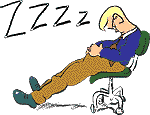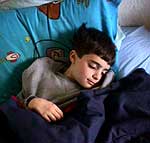 | Lack of Sleep Affects Schoolwork |
 December 14, 2005
December 14, 2005
"Turn off the light!" Have your parents ever said these things to you? Why should you go to sleep? It's not as if missing some sleep will affect how you will do in school. Or will it? New experiments show that schoolwork will suffer if young students do not get enough sleep.
Dr. Gahan Fallone and his fellow researchers at Brown Medical School (Providence, RI) studied the sleep habits and school performance of 74 children (39 boys, 35 girls, 6.5 to 12.9 years old). The children began the experiment by keeping track of when they went to sleep and when they woke up during a normal week (baseline schedule). After one week of tracking their sleep, the children went on a restricted sleep schedule or an optimized sleep schedule. After the second week, the groups switched schedules. Thus, each child had sleep records from 1) a baseline schedule, 2) a restricted sleep schedule and 3) an optimized sleep schedule. Each child wore an activity monitor on his or her wrist, kept a sleep diary and phoned the laboratory to provide an accurate record of the sleep-wake cycle. At the end of each sleep schedule, the child's teacher rated each student for:
Lack of Sleep Hurts SchoolworkOn baseline days, children spent an average of 570 minutes (9.5 hours) in bed and 538 minutes (9.0 hours) sleeping. On a restricted sleep schedule, children spent only 406 minutes (6.8 hours) in bed and 399 minutes (6.7 hours) sleeping. On an optimized sleep schedule, children spent 613 (10.2 hours) minutes in bed and 577 minutes (9.6 hours) sleeping.
As expected, when children slept less (restricted schedule), their teachers rated them as more sleepy and they had more attention and concentration problems. Teachers also reported that children who slept less had more schoolwork problems than when the children were on their normal sleep schedule or optimal sleep schedule. The different sleep schedules did not produce any differences in the teachers' ratings of students' hyperactive-impulsive behavior, internalizing symptoms, or oppositional-aggressive behavior. So, getting less sleep may affect the quality of your schoolwork!
|
Reference and more information:
|
| BACK TO: | Neuroscience In the News | Table of Contents |
![[email]](./gif/menue.gif) Send E-mail |
 Fill out survey |
 Get Newsletter |
 Search Pages |
